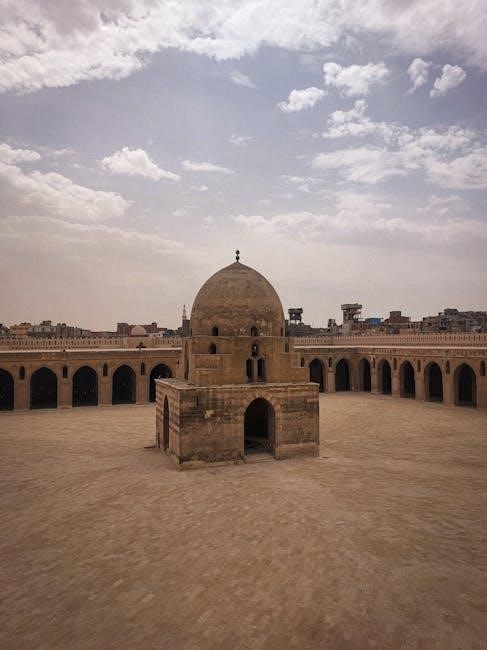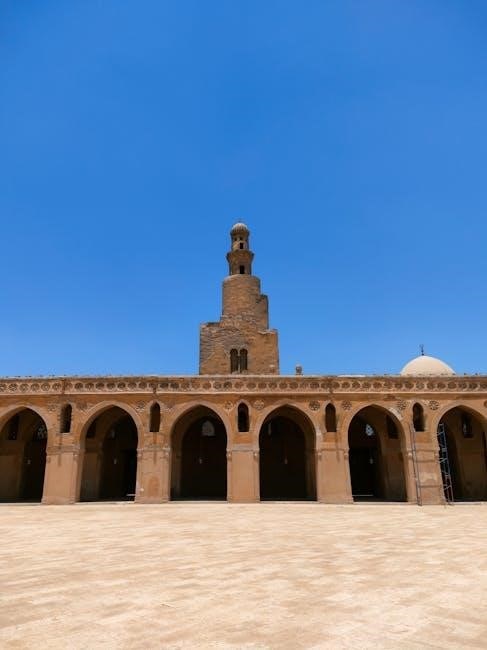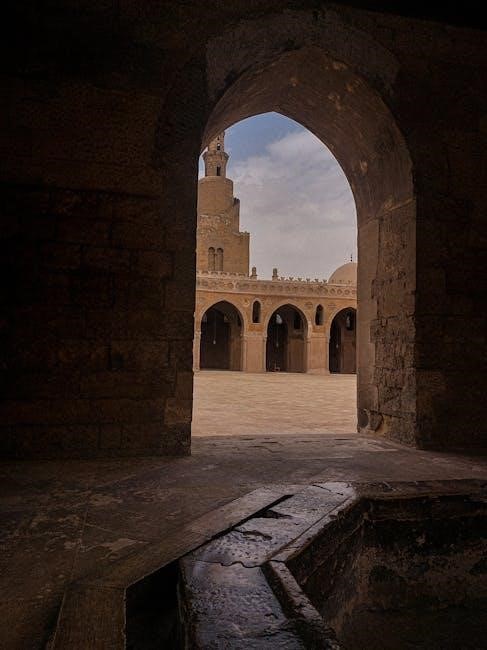
Ibn Khaldun‚ a 14th-century scholar‚ authored The Muqaddimah‚ a seminal work in sociology‚ history‚ and economics․ This groundbreaking text laid the foundation for understanding human civilization and societal structures․ Available as a PDF‚ The Muqaddimah remains a vital resource for exploring Khaldun’s theories on history‚ social cohesion‚ and economic systems‚ offering insights into medieval Islamic thought and its enduring relevance․
Overview of Ibn Khaldun’s Life and Contributions
Ibn Khaldun‚ a 14th-century polymath‚ is renowned for his groundbreaking work‚ The Muqaddimah․ Born in 1332 in Tunis‚ he laid the foundations for sociology‚ economics‚ and historiography․ His contributions include pioneering the concept of asabiyyah (social cohesion) and analyzing societal cycles․ Khaldun’s life‚ marked by political roles and scholarly pursuits‚ deeply influenced his writings․ The Muqaddimah‚ available as a PDF‚ remains a cornerstone of Islamic scholarship‚ offering insights into human civilization and societal structures․ His work bridges medieval Islamic thought with modern interdisciplinary studies‚ cementing his legacy as a visionary thinker․
The Significance of the Muqaddimah in Historical Context
The Muqaddimah‚ written by Ibn Khaldun in the 14th century‚ is a landmark work that revolutionized historical scholarship and social sciences․ It introduced innovative methodologies for analyzing human societies‚ emphasizing factors like geography‚ economics‚ and social cohesion․ Khaldun’s critique of traditional historiography and his emphasis on empirical observation set a new standard for understanding historical processes․ The work’s relevance extends beyond its medieval context‚ as it bridges Islamic scholarship with modern interdisciplinary approaches․ Its PDF availability has made it accessible to global audiences‚ ensuring its enduring influence on both academic and contemporary discussions of society and history․

Biography of Ibn Khaldun
Abd al-Rahman Ibn Khaldun‚ born in Tunis in 1332‚ was a polymath whose work spanned history‚ sociology‚ and economics․ His tumultuous life‚ marked by political roles and exile‚ culminated in writing The Muqaddimah‚ a groundbreaking analysis of human society and history․ His legacy endures as a pioneer of social sciences‚ offering timeless insights into civilization’s dynamics․
Early Life and Education
Abd al-Rahman Ibn Khaldun was born on May 27‚ 1332‚ in Tunis‚ to a noble family of Arab descent․ His early life was marked by a deep immersion in Islamic scholarship and classical education․ Ibn Khaldun pursued studies in Arabic‚ theology‚ jurisprudence‚ and philosophy‚ benefiting from the intellectual vibrancy of 14th-century Tunis․ His education was traditional yet comprehensive‚ emphasizing the Quran‚ Hadith‚ and the works of renowned Islamic scholars․ These formative years laid the foundation for his later intellectual contributions‚ particularly in his magnum opus‚ The Muqaddimah․
Career and Political Involvements
Ibn Khaldun’s career was marked by political turbulence and intellectual pursuits․ He served as a secretary and counselor in various North African courts‚ including Tunis and Fez‚ navigating the complex dynamics of regional politics․ His involvement in political life often led to relocations‚ reflecting the unstable environment of the time․ Despite these challenges‚ he maintained a focus on scholarship‚ eventually settling in Egypt‚ where he became a prominent judge and scholar․ His political experiences deeply influenced his sociological insights‚ as documented in The Muqaddimah․ This duality of political engagement and academic reflection defined his legacy․
Later Life and Legacy
Ibn Khaldun’s later life was marked by relative stability after his turbulent career․ He settled in Cairo‚ where he served as a respected judge and continued his scholarly work․ His masterpiece‚ The Muqaddimah‚ solidified his legacy as a pioneering thinker in sociology‚ economics‚ and historiography․ After his death in 1406‚ his work remained influential‚ shaping later scholars’ understanding of societal structures and historical analysis․ Today‚ the Muqaddimah is widely studied in PDF and other formats‚ ensuring Khaldun’s ideas remain accessible and relevant for modern scholarship and intellectual discourse․

The Muqaddimah: An Overview
The Muqaddimah is Ibn Khaldun’s magnum opus‚ a foundational text in sociology‚ history‚ and economics․ It explores human civilization‚ societal structures‚ and historical patterns‚ offering profound insights into social dynamics and economic systems․ This seminal work is widely regarded as a precursor to modern social sciences and remains accessible today in PDF formats‚ ensuring its enduring influence on scholarly discourse and intellectual exploration․
Structure and Content of the Muqaddimah
The Muqaddimah is divided into six chapters‚ each addressing distinct aspects of human civilization and society․ It begins with an introduction to history and its methodology‚ followed by chapters on the nature of society‚ economics‚ politics‚ and education․ The work emphasizes the role of asabiyyah (social cohesion) in shaping historical outcomes․ Khaldun also explores the cyclical rise and fall of empires‚ offering insights into human behavior and societal structures․ The text is rich in historical examples‚ making it a comprehensive analysis of medieval Islamic thought and its relevance to understanding human progress․ Its systematic approach laid the groundwork for modern social sciences․
Key Themes and Concepts
In the Muqaddimah‚ Ibn Khaldun explores themes such as asabiyyah (social cohesion)‚ the cyclical rise and fall of empires‚ and the role of economics in shaping societies․ He emphasizes the importance of education and knowledge in societal progress‚ critiquing traditional historiography for its lack of analytical depth; Khaldun also examines the interplay between urban and rural life‚ highlighting the dynamics of power and resource distribution․ His theories on historical patterns and human behavior remain foundational in understanding medieval Islamic thought and continue to influence modern sociopolitical analysis․ The text underscores the complexity of human civilization and its enduring challenges․

Historical Context of the Muqaddimah
The Muqaddimah was written in the 14th century amidst the turmoil of the Black Death‚ political instability‚ and the decline of Islamic Golden Age empires․ Ibn Khaldun‚ witnessing these upheavals‚ sought to understand the cyclical nature of history and societal collapse․ He drew from his experiences in North Africa and the Mediterranean‚ analyzing the interplay of power‚ religion‚ and economics․ The text reflects his observations on the rise and fall of dynasties and the role of social cohesion in shaping civilizations․ This historical backdrop informed his pioneering theories on sociology‚ economics‚ and historiography‚ offering a unique lens on medieval Islamic society․

Key Concepts in the Muqaddimah
The Muqaddimah introduces key concepts like ‘asabiyyah’ (social cohesion) and historical cycles‚ explaining the rise and fall of states through urbanization’s societal impact and dynamics․
The Concept of Asabiyyah (Social Cohesion)
Asabiyyah‚ or social cohesion‚ is a central concept in Ibn Khaldun’s Muqaddimah‚ describing the bonds of solidarity and unity within communities․ It emerges from shared experiences‚ kinship ties‚ and common interests‚ fostering collective identity․ Asabiyyah is crucial for the rise and survival of states‚ as it enables groups to overcome external challenges․ However‚ Khaldun notes that as societies grow and urbanize‚ asabiyyah often declines‚ leading to internal fragmentation and vulnerability․ This theory remains relevant in understanding modern social dynamics and the cyclical nature of political power․
Theories on History and Society
Ibn Khaldun’s Muqaddimah presents groundbreaking theories on the cyclical nature of history and society․ He argued that human history follows a pattern of rise‚ zenith‚ decline‚ and fall‚ influenced by factors like geography‚ economics‚ and leadership․ Khaldun emphasized the role of asabiyyah (social cohesion) in shaping societies‚ noting that strong collective identity drives initial success but often erodes as societies urbanize and grow complex․ His work also explored the interplay between nomadic and sedentary cultures‚ highlighting how environmental conditions shape societal structures․ These theories‚ outlined in the PDF versions of The Muqaddimah‚ remain foundational in sociology and historiography‚ offering timeless insights into human civilization․
Economic and Political Theories
In the Muqaddimah‚ Ibn Khaldun advanced innovative economic theories‚ emphasizing labor as the source of value and discussing supply‚ demand‚ and market dynamics․ He analyzed taxation’s impact on economic prosperity‚ warning against excessive burdens that could lead to decline․ Politically‚ Khaldun explored the cyclical nature of states‚ arguing that dynasties rise and fall due to internal decay and external pressures․ He stressed the importance of justice‚ effective governance‚ and balancing state revenue with public welfare․ These ideas‚ detailed in PDF versions of his work‚ remain influential in understanding economic systems and political stability‚ offering insights into sustainable governance and societal prosperity․

Themes and Ideas in the Muqaddimah
Ibn Khaldun’s Muqaddimah explores themes of social structure‚ religion’s role in society‚ and the importance of education and knowledge in shaping civilizations‚ offering timeless insights into human development․
Social Structure and Change
Ibn Khaldun’s Muqaddimah provides a detailed analysis of social structures‚ emphasizing the cyclical nature of empires and civilizations․ He explores the interplay between urban and rural societies‚ noting the decline of empires due to internal corruption and external pressures․ Khaldun’s concept of asabiyyah (social cohesion) is central‚ highlighting its role in the rise and fall of dynasties․ He also examines how economic factors‚ such as trade and taxation‚ influence social stability․ Khaldun’s insights into the dynamics of power‚ inequality‚ and societal transformation remain remarkably relevant‚ offering a comprehensive understanding of historical and contemporary social change․
The Role of Religion in Society
In the Muqaddimah‚ Ibn Khaldun emphasizes religion’s pivotal role in shaping societal morals and legal frameworks․ He argues that religion fosters unity and stability‚ particularly in early societies‚ by providing a shared ethical foundation․ Khaldun notes that religious beliefs often influence political authority‚ legitimizing rulers and their governance․ However‚ he also critiques the misuse of religion for political manipulation․ His analysis highlights the dynamic interplay between religion and societal structures‚ underscoring its enduring impact on human civilization․ This perspective remains relevant‚ offering insights into religion’s role in shaping cultural and political landscapes historically and contemporarily․
Education and Knowledge
In the Muqaddimah‚ Ibn Khaldun underscores the importance of education as a cornerstone of societal progress․ He advocates for a balanced approach‚ combining theoretical knowledge with practical skills to foster intellectual and moral development․ Khaldun emphasizes the role of skilled teachers in guiding learners and the need for critical thinking over mere memorization․ He also highlights the transmission of knowledge across generations as essential for preserving civilization․ Education‚ in his view‚ not only enlightens individuals but also strengthens societal structures‚ ensuring adaptability and innovation․ This perspective on education remains influential‚ stressing its role in shaping both personal and collective advancement․

Historical Context and Influence
The 14th-century Mediterranean world‚ marked by political upheaval and the Black Death‚ shaped Ibn Khaldun’s insights in the Muqaddimah․ His work profoundly influenced later scholars‚ offering timeless perspectives on societal dynamics and historical analysis․
The 14th-Century Mediterranean World
The 14th-century Mediterranean world was a realm of profound upheaval‚ marked by the Black Death‚ political instability‚ and the decline of the Abbasid Caliphate․ This era shaped Ibn Khaldun’s observations on societal collapse and renewal․ The region’s diverse cultures‚ from the Islamic west to the Christian kingdoms‚ influenced his analysis of historical patterns․ The rise and fall of empires‚ coupled with economic shifts‚ provided a fertile ground for his theories on asabiyyah and societal structure․ The Muqaddimah reflects this turbulent period‚ offering a unique lens through which to understand the dynamics of civilization and human history․
Influence of the Muqaddimah on Later Scholars
The Muqaddimah profoundly influenced later scholars‚ shaping fields like sociology‚ economics‚ and historiography․ Its concepts‚ such as asabiyyah and cyclical theories of history‚ inspired thinkers across the Islamic world and beyond․ Modern scholars like Ernest Gellner and Eric A․ Nordlinger have drawn on Khaldun’s ideas to analyze societal structures and political dynamics․ The work’s emphasis on empirical observation and systemic analysis laid the groundwork for modern social sciences‚ earning Ibn Khaldun recognition as a pioneer in these disciplines․

Reception and Legacy
The Muqaddimah is hailed as a groundbreaking work‚ influencing scholars across disciplines․ Its innovative theories on society and history remain relevant‚ shaping modern thought and scholarship․
Impact on Islamic Thought and Scholarship
Ibn Khaldun’s Muqaddimah revolutionized Islamic scholarship by introducing systematic approaches to history‚ sociology‚ and economics․ His theories on social cohesion (asabiyyah) and cyclical patterns of societal rise and decline reshaped Islamic thought․ The work challenged traditional historical narratives‚ emphasizing empirical observation and critical analysis․ It influenced later Islamic scholars‚ encouraging interdisciplinary approaches and laying the groundwork for modern social sciences․ The Muqaddimah’s emphasis on human agency and societal dynamics remains a cornerstone of Islamic intellectual heritage‚ inspiring scholars to explore the complexities of human civilization․
Modern Interpretations and Relevance
The Muqaddimah remains a cornerstone of modern scholarship‚ offering timeless insights into sociology‚ economics‚ and history․ Contemporary researchers draw parallels between Ibn Khaldun’s theories on social cohesion and modern concepts of community building․ His ideas on economic cycles and state formation are studied in the context of globalization and urbanization․ The PDF availability of the Muqaddimah has made it accessible to a global audience‚ inspiring interdisciplinary approaches in understanding human societies․ Its relevance extends beyond medieval Islamic thought‚ providing a framework for analyzing contemporary societal challenges and fostering cross-cultural intellectual exchange․

Availability of the Muqaddimah in PDF
The Muqaddimah by Ibn Khaldun is widely available as a PDF through academic presses and digital libraries‚ offering both free and paid access to its translated versions online․
Sources for Downloading the Muqaddimah PDF
The Muqaddimah is accessible in PDF through various sources․ Princeton University Press offers a translated version‚ while platforms like Internet Archive and Google Scholar provide free downloads․ Additionally‚ online libraries and academic repositories feature scanned editions of the text․ Some websites allow direct downloads‚ but verify the source’s reliability․ Purchasing e-book versions from reputable stores like Amazon or Google Books is also an option․ For free access‚ consider checking local libraries or educational institutions‚ as they often host digital copies․ Ensure compliance with copyright laws when accessing or sharing the PDF․
Comparing Different Editions and Translations
Different editions and translations of the Muqaddimah vary in depth and interpretation․ The Princeton University Press edition‚ translated by Franz Rosenthal‚ is renowned for its accuracy․ Abridged versions simplify the text for accessibility‚ while original Arabic PDFs preserve linguistic nuances․ Some translations include commentary‚ enhancing understanding for modern readers․ Comparing editions reveals variations in thematic emphasis‚ with some focusing on historical context and others on sociological insights․ Each version offers unique perspectives‚ making it beneficial for scholars to explore multiple translations to grasp the full complexity of Ibn Khaldun’s ideas․
Ibn Khaldun’s Muqaddimah remains a foundational text‚ shaping sociology‚ history‚ and economics․ Its insights into human civilization and societal dynamics continue to resonate‚ ensuring its enduring relevance and influence․

Final Thoughts on Ibn Khaldun’s Contribution
Ibn Khaldun’s Muqaddimah is a masterpiece that redefined historical and social analysis․ His theories on asabiyyah‚ economic cycles‚ and state formation remain influential․ Khaldun’s work bridges medieval Islamic scholarship with modern social sciences‚ offering timeless insights into human societies․ His emphasis on empirical observation and systemic analysis set a precedent for future scholars․ The availability of The Muqaddimah in PDF has made his ideas accessible to a global audience‚ ensuring his legacy as a pioneer in multiple fields․ His work continues to inspire interdisciplinary studies‚ solidifying his place as one of history’s greatest thinkers․
The Enduring Relevance of the Muqaddimah
The Muqaddimah remains a cornerstone of intellectual inquiry‚ offering insights into sociology‚ economics‚ and history․ Its concepts‚ such as asabiyyah and cyclical societal change‚ continue to resonate with modern scholars․ The text’s emphasis on empirical observation and systemic analysis has influenced fields beyond its original context‚ making it a timeless resource․ The availability of the Muqaddimah in PDF has further expanded its reach‚ enabling global access to Khaldun’s groundbreaking ideas․ Its relevance endures as it bridges medieval Islamic thought with contemporary discussions on societal structures and human civilization‚ ensuring its continued study and adaptation across disciplines․